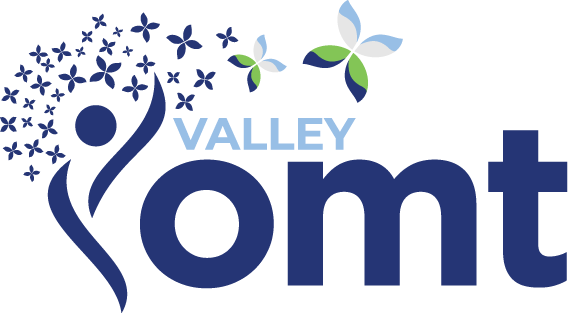As Orofacial Myofunctional Therapists serving Central PA, we regularly help patients understand and address tongue tie concerns. Think of your tongue as a graceful dancer that needs full range of motion to perform.
A tongue tie (or ankyloglossia) is like having that dancer’s movement restricted by a too-tight costume.
At Valley OMT in Camp Hill, we work alongside pediatric dentists, ENTs, and lactation consultants throughout the greater Harrisburg area to provide comprehensive tongue tie care.
Types of Tongue Tie
Tongue ties can present in several ways, each affecting function differently:
Anterior Tongue Tie
Located near the tip of the tongue, this type is most visible and commonly recognized. It often affects nursing, speech, and tongue mobility.
Posterior Tongue Tie
Hidden further under the tongue, this type can be harder to identify but may significantly impact function and development.
Impact Across Different Ages
Infants and Nursing
Working with lactation consultants from UPMC and Penn State Health, we often see how tongue tie affects:
- Difficulty with latching and feeding
- Poor weight gain
- Maternal discomfort
- Extended feeding times
- Clicking sounds while nursing
Children
Our collaboration with local pediatric specialists reveals how tongue tie influences:
- Speech development
- Eating habits
- Social confidence
- Oral hygiene
- Sleep breathing patterns
Adults
Many adult patients throughout Central PA seek treatment for ongoing effects of tongue tie, including TMJ pain, neck tension, and speech challenges.
The Diagnostic Journey
At Valley OMT, located conveniently off Route 11/15 in Camp Hill, we provide comprehensive evaluations that include:
Initial Assessment
- Detailed oral examination
- Functional movement testing
- Feeding observation when relevant
- Speech and swallowing evaluation
- Breathing pattern assessment
Treatment Planning
We coordinate with local healthcare providers to develop personalized treatment plans that may include:
- Pre-treatment therapy
- Referral for revision (frenectomy) if needed
- Post-revision rehabilitation
- Ongoing support and monitoring
Recovery and Support
Following tongue tie treatment, our team provides:
- Specific exercises for optimal healing
- Guidance for pain management
- Regular progress monitoring
- Coordination with other providers
- Support for families throughout the process
Choosing the Right Care Team
Valley OMT works within a trusted network of Central PA healthcare providers, including:
- Pediatric dentists specializing in tongue tie
- ENT specialists
- Speech therapists
- Lactation consultants
- Pediatricians
Take the First Step
Located in Camp Hill and serving families throughout Central PA, from Mechanicsburg to Carlisle, we provide evidence-based evaluation and treatment for tongue tie.
Contact our office today to schedule a consultation. Early intervention can make a significant difference in treatment outcomes.
Frequently Asked Questions
Q: How long does tongue tie treatment take? A: Treatment duration varies, but most patients complete therapy within 3-6 months.
Q: Does insurance cover tongue tie treatment? A: Many Pennsylvania insurance plans provide coverage. Our staff can verify your benefits.
Q: How do I know if my child needs treatment? A: We provide comprehensive evaluations to determine if treatment would be beneficial.
Q: What’s involved in recovery after revision? A: We provide detailed post-procedure care plans and ongoing support throughout the healing process.
